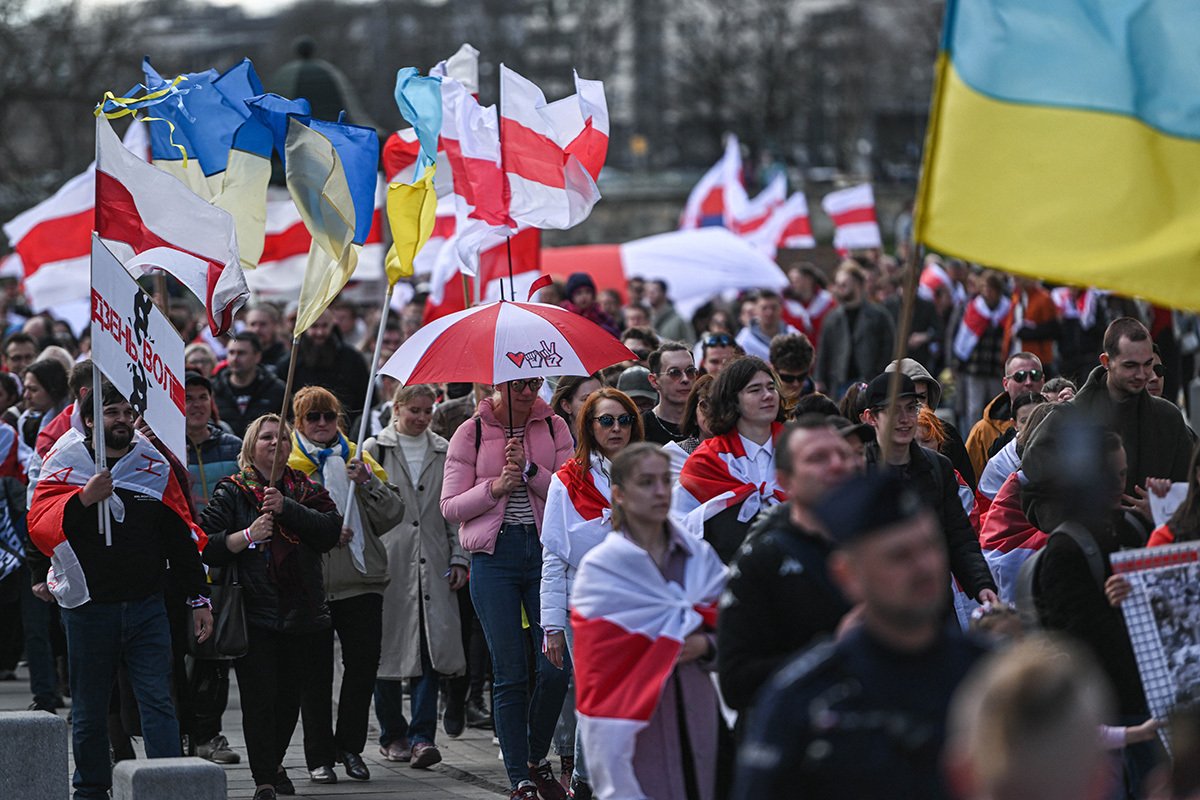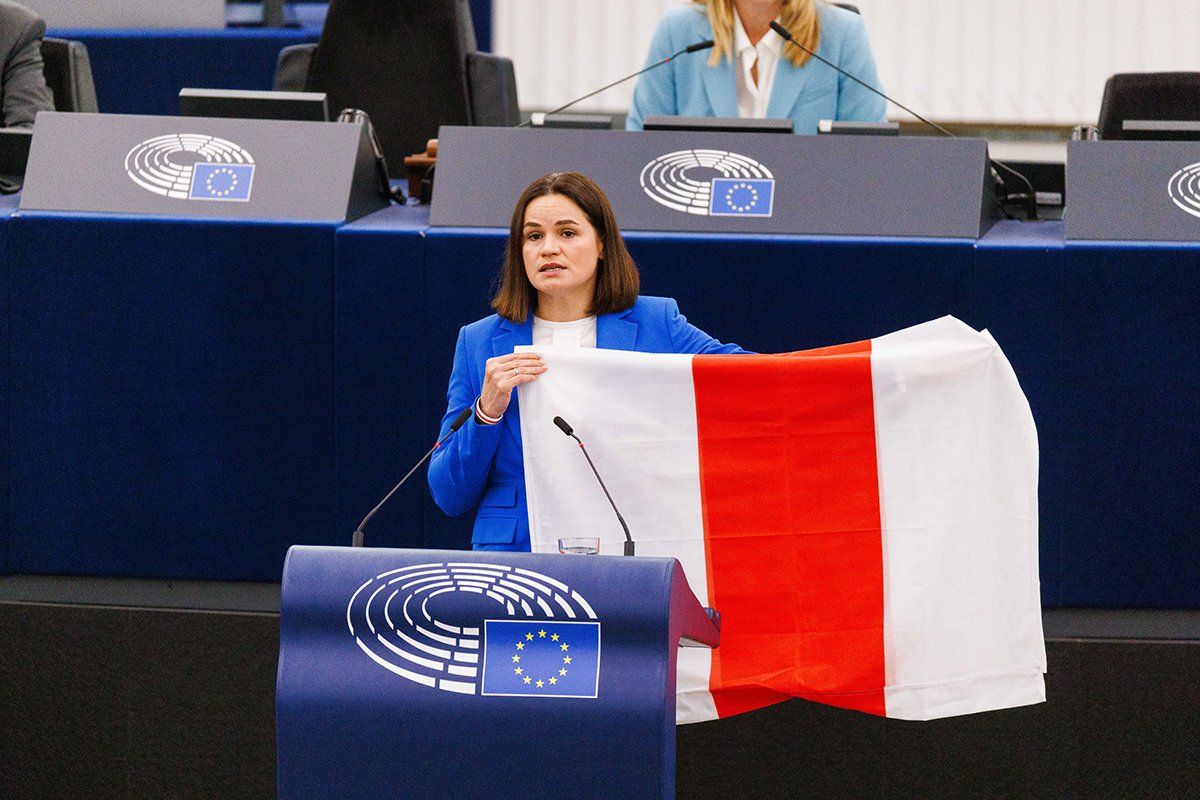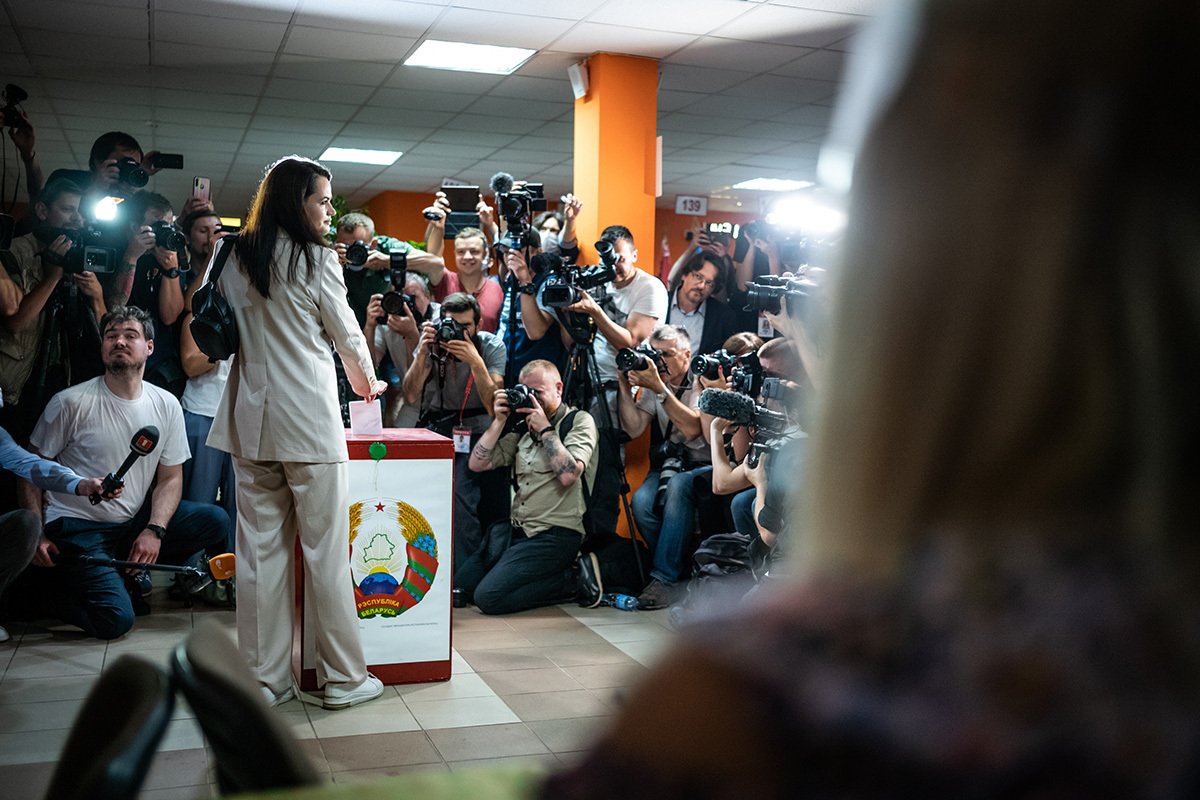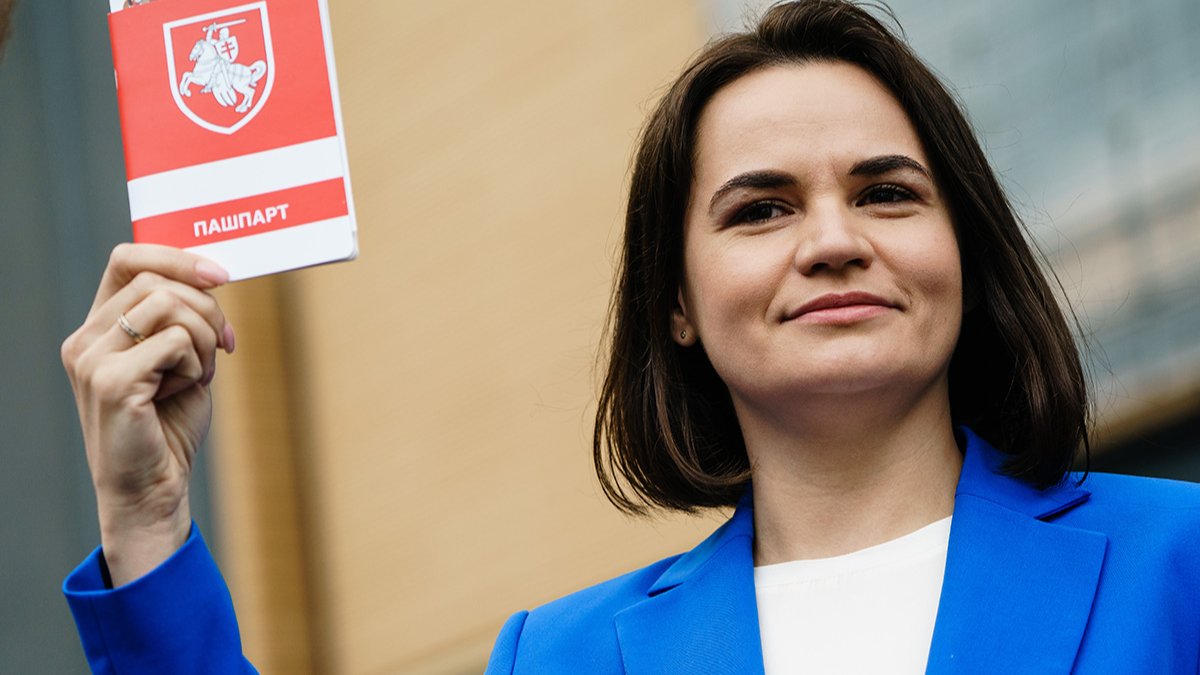Sviatlana Tsikhanouskaya shot to worldwide fame in 2020 when she stepped into her jailed husband’s shoes to successfully challenge Belarusian dictator Alexander Lukashenko in the presidential elections, allowed to run largely as the veteran incumbent believed a woman would be unable to pose a threat to his 25-year rule.
While it’s impossible to know how many votes Tsikhanouskaya received amid the rampant ballot box stuffing, protests erupted across the country when a sixth landslide for Lukashenko was announced. Threatened by the local KGB with years in jail and having her young children become wards of the state, Tsikhanouskaya was effectively forced into exile in Lithuania, from where she heads the Coordination Council of Belarus, a government in exile.
Her shadow government’s proposal to issue a New Belarus passport for the tens of thousands of Belarusians who fled the country after protesting the stolen elections was given a new urgency following Minsk’s announcement that Belarusian consulates would no longer renew passports abroad, leaving many citizens to make the stark choice between being left with no valid documents or returning home and risking harsh jail sentences for their role in the protests.
NGE: What does Alexander Lukashenko’s decree ending the renewal of passports by Belarusian consulates abroad mean for the New Belarus passport?
ST: We began working on the Belarus passport a year ago … It was meant as a symbolic document. But Lukashenko played into our hands to some extent, because recognising this document has become a matter of urgency and so it’s a good thing that we had already prepared for it.
NGE: Did Lukashenko devise this scheme to force the Belarus opposition to return home so he could imprison them there?
ST: I think he did it primarily as an act of vengeance on Belarusians who took to the streets and who continue to oppose him three years later. The regime can put anyone in the country in jail at any time, but those who left remain beyond its grasp. I don’t think that it was done to force people back to Belarus — in reality, the regime wants to get rid of everyone who left Belarus for fear of persecution. They just wanted to create more difficulties for them … There have already been attempts to make people return to Belarus to renew their passports and they were immediately arrested. Lukashenko has made it clear that there’ll be no free passes.

Belarusians attending a Freedom Day rally on 25 March 2023 in Krakow, Poland. Photo: Omar Marques / Anadolu Agency / Abaca Press / ddp images / Vida Press
NGE: The Russian opposition, as you’ve probably heard, tried something similar to the New Belarus passport but it failed. Why do you think your proposal is moving forward?
ST: We are in a different situation as we have institutions that are recognised as legitimate overseas and which are authorised to issue documents. We simply didn’t have this before. At the same time, when we talk about this project, we cite the example of Lithuanians who issued passports abroad while being under [Soviet] occupation. We point to Kosovo, whose passport is accepted even by states that don’t recognise it as an independent country. So there is room for manoeuvre here. Perhaps it’s because the Russians didn’t need their version urgently and so that’s why it all came to a halt, while we have the lives of hundreds of thousands of people who could be left without any documents altogether at stake.
NGE: When European countries, especially the Baltic States and Poland, take measures against Russia, Belarus is usually targeted as well. Do you think that there should be a distinction drawn between the two?
ST: We don’t want Belarus and Russia to be put in the same category. If there’s a need to adopt a law aimed at Belarusians and Russians alike, do so under different articles. As when a national government lumps Russia and Belarus together, the people and lawmakers of that country begin to be seen as one and the same, which would mean that Lukashenko’s regime would become indistinguishable from Belarusians.
NGE: Does Belarus bear the same degree of responsibility for the aggression against Ukraine as Russia?
ST: The Belarusian regime bears the same responsibility. I try to explain to everyone that Belarusians are against the war, that Belarusians are already suffering from Lukashenko’s regime. I ask them not to confine Belarusians to Lukashenko’s big prison, to give people the right to travel, to leave for good if need be and to study at foreign universities. Why do I think Lukashenko’s regime has managed to survive for so long? Simply as after the collapse of the Soviet Union people didn’t know what democracy was until the arrival of the internet and until they were able to travel overseas. It was just an empty word to them. They did not know how people [in the West] lived and what it meant to have freedom of speech.

Sviatlana Tsikhanouskaya holding up a white-red-white flag, the historical flag of Belarus, during a session of the European Parliament in Strasbourg. Photo: Philipp von Ditfurth / picture alliance / Getty Images
NGE: Belarus appears not to be taking a very active part in the war as Belarusian soldiers are not involved in the fighting.
ST: We can see the letter Z [a prominent pro-war symbol] in the streets of Russia, we see Russians who are very aggressive towards Ukraine. You will never see anything like that in Belarus. Belarusians simply do not understand how you can attack your neighbour. Belarusians do not understand this, while Russians still have imperialistic ambitions and they apply to the majority of the population, unfortunately. I sometimes read or hear other politicians saying that Lukashenko blocked moves to add the Belarusian forces to the Russian army. But it is not something he should be credited for. He simply knew that our Belarusian military completely opposed the war, that they would not kill anyone and would immediately go over to the other side, hide, or avoid engagement by any means possible. They would not go to war. Meanwhile, in Russia, unfortunately, we see mobilisation efforts and people who back the war. It remains to be seen to what extent the war affects the lives of ordinary people somewhere in Siberia but they are all such ardent patriots.
NGE: What is your planned strategy for the 2025 presidential elections in Belarus? Will you boycott them or support someone other than Lukashenko?
ST: We start from the premise that the electoral cycle ended in Belarus in 2020 and that since the elected representatives of the Belarusian people never took office, any vote organised in Belarus will be illegitimate and have nothing to do with elections. A lot can still change before 2025, of course, but discussions are now underway about local and parliamentary elections which are meant to take place in 2024. We had a meeting with the OSCE, which normally sends observers, recently. We suggested that if they’re invited to monitor these elections they should send a preliminary commission to Belarus to verify and ascertain that free and independent elections are impossible in Belarus, the society is repressed, while media outlets are destroyed. Then it will be clear for everyone. As for 2025, our experts say that if the situation remains as it is, the regime will actually be too scared to face the electorate.

Sviatlana Tsikhanouskaya voting at a polling station in Minsk, Belarus, 9 August 2020. Photo: Mikhail Fridman / Getty Images
NGE: Do you imagine ridding Belarus of Lukashenko is possible while Putin is still alive?
ST: First of all I’ll say that the future of Belarus doesn’t depend on Putin or Lukashenko but on the Belarusian people alone. The Belarusians do not see the future of their country with Putin’s Russia. Of course, Putin doesn’t see Belarus or Ukraine as independent states. To his mind we are merely a part of his empire. Of course, control over Belarus is crucial to Putin’s Russia, and as such, Russian imperialism will always pose a threat to Belarus. It is very difficult to think ahead. We understand that we want a Belarus without Lukashenko and without Russian influence. Achieving this requires tactical steps, and we do have a strategy. But Lukashenko will only be able to cling to power as long as Putin backs him. No longer. And even Putin’s support for Lukashenko could waver at any moment. It’s not guaranteed that Putin will be as strong as he used to be. I sincerely hope that Russian society will start asking questions after the squandering of so many billions and so many human lives.
NGE: The exiled Russian opposition also dreams of Putin’s departure but there is no real plan for how to achieve it. Everyone seems to be waiting for him either to die or to be deposed by his entourage. Do you have any sort of plan?
ST: Are you using this time to unite, to strengthen civil society in Russia and maintain ties with those who stayed in the country? I have no idea about how opposition movements work inside and outside of Russia. But I do know the Belarusians are doing it. Our main goal is to maintain connections, support Belarusians in Belarus as much as we can, explain what is happening, how we work and what we are working towards. For instance, [we lobby for] economic sanctions not to reduce Belarusian living standards but to empty the coffers of Lukashenko’s businessmen so that they begin to understand that it’s his actions that are responsible for sanctions.
NGE: Your answer suggests you don’t have any contact with the Russian opposition abroad. Why is that?
ST: Generally speaking, I know a lot of Russian opposition figures. I met [Vladimir] Kara-Murza just before he returned to Russia and was imprisoned. The Russian opposition supports sanctions on Lukashenko and Putin, wants to decolonise Russia and creates content to explain to Russians what’s going on … There are points of contact but the situations our two countries find themselves in are completely different … If you ask a person in Belarus about the war, they will stay silent and won’t condemn it openly because they know they could end up in prison for a few words. But they will never say that they support the war and that what Russia is doing is right. Never. And that’s the major difference. You might not feel it but for me that’s a colossal gap.
Join us in rebuilding Novaya Gazeta Europe
The Russian government has banned independent media. We were forced to leave our country in order to keep doing our job, telling our readers about what is going on Russia, Ukraine and Europe.
We will continue fighting against warfare and dictatorship. We believe that freedom of speech is the most efficient antidote against tyranny. Support us financially to help us fight for peace and freedom.
By clicking the Support button, you agree to the processing of your personal data.
To cancel a regular donation, please write to [email protected]

